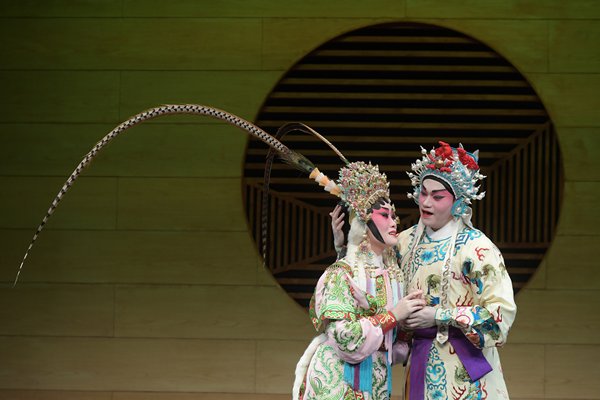Old Art Form, New Experience

It is curtain up for the Xiqu Centre on January 20. The West Kowloon Cultural District’s first landmark performing arts venue will offer audiences a unique opera-going experience. The arts hub is reviving an old tradition by bringing together Cantonese opera and tea-drinking at its Tea House Theatre.
To recreate the warm, authentic atmosphere of Hong Kong’s early 20th century tea houses, audiences are served traditional tea and dim sum during the performance.
The Tea House Theatre at the Xiqu Centre is specially designed to introduce new audiences to Chinese traditional theatre.
The 90-minute performances, presented by the theatre’s own Tea House Rising Stars Troupe, will feature a selection of short excerpts to showcase a range of vocal and music styles.
The performances are in Cantonese, but all audiences are accommodated for. Chinese and English subtitles are provided, while student matinees and programmes for tour groups with narration in English or Mandarin are also available on request.
Rising stars
“The Tea House Theatre is a totally new concept for Hong Kong. We have a small theatre with a contemporary Chinese theatre setting, which can accommodate from 150 to 200 (capacity) audiences,” noted West Kowloon Cultural District Authority Executive Director of Performing Arts Louis Yu.
He added that Hong Kong not only gains a new leisure and cultural destination, but also a place where the next generation of Cantonese opera talent can develop their skills.
“This is a very important platform for us to nurture the new generation of Cantonese opera stars. We hope that by providing this platform, our next generation of Cantonese opera stars will develop their artistry and gain the audience’s support.”
A group of younger generation Cantonese opera practitioners will perform from Wednesday to Sunday every week, Mr Yu added.
Alan Tam is part of that younger generation. He is a Cantonese opera actor with the Tea House Rising Stars Troupe. The 25-year-old found his calling at the tender age of three when he started singing Cantonese opera.
“When I was young I liked the actors’ accessories. I do love performing. I joined the Tea House Rising Stars Troupe so that I could perform for audiences. Performing in the Tea House Theatre every week also helps to improve my skills.”
Mr Tam also hopes that as a young Cantonese opera actor, he can help attract a younger audience.
Ultimate venue
The city’s first venue dedicated to the development of Chinese opera not only houses the more intimate Tea House Theatre but also a Grand Theatre, accommodating 1,073 seats, eight professional studios and a seminar hall. All the facilities are specially designed for different types of Chinese opera-related functions and activities, while providing state-of-the-art equipment for staging world-class productions.
There are high hopes for the Xiqu Centre’s place on the world stage and for it to become the ultimate performance destination in Hong Kong for Chinese opera practitioners.
“I want the Xiqu Centre to gain this kind of status. So that all good performers in Hong Kong and from all over China will wish and will dream that they will one day have the opportunity to perform in the Grand Theatre of the Xiqu Centre,” said Mr Yu.
The centre also provides guided tours in Cantonese, English and Mandarin to help visitors explore the facilities, learn about its architectural and design features, and discover fascinating facts about the culture and stories behind the art of Chinese opera.
Moving Waste Management Forward
Located on an artificial island near Shek Kwu Chau, the Integrated Waste Management Facilities Phase I, I·PARK1, repr... Read more
Walkway Fulfills Harbourfront Vision
Since opening late last month, the Eastern Section of the East Coast Boardwalk, at North Point, has been a popular dra... Read more
Hiking Challenge Honours Natural Gem
As the sun rises over Victoria Harbour, the city starts its day with people filling Lugard Road – jogging, walking d... Read more
Autonomous Vehicles Drive HK Forward
Autonomous driving technology is advancing rapidly, with the potential to boost traffic efficiency and improve road sa... Read more
Supercomputing Sparks AI Innovation
To promote the development of the local artificial intelligence (AI) ecosystem, the Government has allocated $3 billio... Read more
Tours Showcase HK Brands
Imagine being able to step back in time to a 1950s grocery store where the product packaging is full of nostalgic char... Read more

